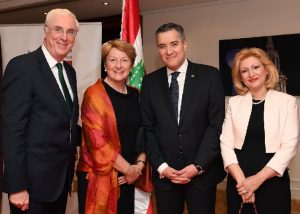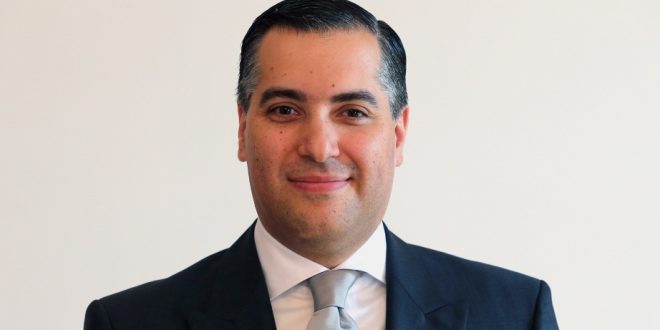31-08-2020
BEIRUT: An influential group of former Lebanese prime ministers has picked little-known diplomat Mustapha Adib to head the country’s next government, all but ensuring his appointment at a nomination process on Monday.
 Fouad Siniora, speaking on behalf of the group which met on Sunday, said Adib should rapidly form a government capable of implementing long-overdue reforms and overseeing Beirut’s reconstruction following a massive explosion that killed at least 190 people and damaged large parts of the capital earlier this month.
Fouad Siniora, speaking on behalf of the group which met on Sunday, said Adib should rapidly form a government capable of implementing long-overdue reforms and overseeing Beirut’s reconstruction following a massive explosion that killed at least 190 people and damaged large parts of the capital earlier this month.
The group of four former prime ministers represents the largest number of Sunni Muslim MPs in Lebanon’s parliament, including the Future Movement bloc of former Prime Minister Saad Hariri. Their support is seen as essential for the success of the prime minister, who under Lebanon’s sectarian power-sharing pact must always be Sunni.
Former Prime Minister Hassan Diab had the support of just a handful of parliament’s 27 Sunni MPs in addition to little popular support. His six-month government, which resigned in the wake of the August 4 explosion, is widely seen as having failed to make headway on vital economic and political reforms demanded by massive protests that led to Hariri’s resignation last year as prime minister.
 On Monday morning, President Michel Aoun is due to hold binding consultations with MPs to go through the formal motions of picking the next prime minister, who must then form a government – a process which in the past has taken many months.
On Monday morning, President Michel Aoun is due to hold binding consultations with MPs to go through the formal motions of picking the next prime minister, who must then form a government – a process which in the past has taken many months.
The consultations will begin with three of the four former prime ministers and Hariri’s Future Movement bloc, all of whom are set to nominate Adib, Lebanon’s ambassador to Germany. Most other major blocs, including Hezbollah, the Amal Movement and the Free Patriotic Movement, have indicated they will follow suit, easily giving Adib the largest share of votes.
Adib’s designation will come on the eve of French President Emmanuel Macron’s second trip to Lebanon in under a month – a visit set to focus on the need for reform in order to unlock foreign support.
“A gift for Macron, got to love it,” Lebanon analyst Karim Makdisi said on Twitter.
In Beirut just a few days after the devastating explosion, Macron had proposed Lebanese leaders come to a new political understanding and warned failure to change could lead to deep unrest.
 Lebanon is drowning in the worst economic and financial crisis in decades, which has pushed more than half of the population under the poverty line and has left the currency worth only about 20 percent of what it was last summer.
Lebanon is drowning in the worst economic and financial crisis in decades, which has pushed more than half of the population under the poverty line and has left the currency worth only about 20 percent of what it was last summer.
The crisis is fuelled by decades of rampant corruption and mismanagement by the same political leaders who are due to nominate the next prime minister.
If picked, Adib’s government will have to resume stalled negotiations with the International Monetary Fund for a roughly $10bn program a key demand of international donors – and push through reforms to the electricity and the financial sectors that have previously been bogged down by disagreements between Lebanon’s sectarian leaders.
Diab had failed to make headway on this process because of high-level disagreements. And although the next government will be under heavy international pressure to push through reforms, few in Lebanon are inclined to believe Adib’s government will be much different – and some were quick in making parallels between him and Diab.
 “Mustapha Adib seems like another Hassan Diab,” Lebanon analyst Ramez Dagher wrote on Twitter.
“Mustapha Adib seems like another Hassan Diab,” Lebanon analyst Ramez Dagher wrote on Twitter.
Like Diab, Adib is an academic and is not well known among the public.
Adib has a PhD in law and political science and has taught at the state-funded Lebanese University since 2010.
Both have ties to former Prime Minister Najib Mikati, with Adib serving as an adviser to him since 2000, while Diab served as education minister in his cabinet.
Even Adib’s four-letter name is an acronym of Diab.
“This is another attempt to beautify the system with a new face that very few people know and project the image that something is going to change,” Sami Atallah, the director of the Lebanese Center for Policy Studies, told media.
“I doubt anything will, because we’ll see how this government will be formed with representatives of different political parties, just like Diab,” he added, noting one marked difference was that Adib will be nominated by a large number of Sunni MPs, giving him a wider backing. (Int’l Monitoring Desk)
 Pressmediaofindia
Pressmediaofindia




